Abstrakt
Consolatio ad Liviam is a poem written in elegiac couplets at the beginning of 1st century AD by an anonymous author. Although the text used to be attributed to Ovid until as late as 16th century, its artistic level, historical context and meta- as well as intertextual hints almost certainly disprove his authorship. While not exceptionally remarkable as a piece of literature, the Consolatio seems to be of a certain interest from the historical point of view and to bring a valuable image of the Augustus’ entourage as well as funeral rites. It is also a noteworthy example of a combination between two literary traditions, namely those of consolatio and epicedion. Therefore, a first Polish translation should be useful for philologists and, more significantly, historians, who not always have obtained the knowledge of Latin sufficient to read ancient poetry. A pseudo-isometrical translation has been chosen, in order to compromise the Roman colouring with the metrical requirements of the Polish language.Bibliografia
Baehrens E., Poetae Latini Minores, t. 1, Leipzig 1879.
Lenz F.W., P. Ovidii Nasonis „Halieutica”, Fragmenta, Nux. „Incerti Consolatio ad Liviam”,
Torino – Paravia 1939.
Mitterfels R. H., Pseudoovidiana, II: Consolatio ad Liviam, Mitterfels Selbstverl 1982.
Rupprecht H., Consolatio ad Liviam – Trostgedicht für Livia. Lateinischer Text mit Einleitung
Übersetzung, kurzen Erläuterungen und Nachwort, Mitterfels 1982.
Schoonhoven H., Elegiae in Maecenatem: prolegomena, text and commentary, Groningen 1980.
Witlox A., Consolatio ad Liviam, prolegomenis, commentario exegetico, indice instructa, Maastricht
Bickel E., De Consolatione ad Liviam pro Claudio usurpatore Iuliani scripta, RhM 93, 1950, 227.
Danesi Marioni G., Suggestioni ovidiane e senecane nella „Consolatio ad Liviam”, A&R XXXIII, 19-26.
Danesi Marioni G., Un problema testuale nella prima epistola delle Heroides e la „Consolatio ad Liviam”, „Prometheus” XIII, 1987, 13–22.
Enk P.J., L’énigme des Élégies sur Mécène, Mn. IX, 1941, 225–237.
Fraschetti A., Indice analitico della Consolatio ad Liviam Augustam de morte Drusi Neronis filii eius qui in Germania de morbo periit, MEFRA CVIII 1, 1996,191–239.
Holland R., Zu herrenlosen lateinischen Gedichten, PhW 1925, 140–144.
Lenz F. W., Consolatio ad Liviam 319–322, „Eranos” LV, 1957, 202–203.
Morel W., Zur Consolatio ad Liviam, „Hermes” LX, 1925, 493–494.
Richmond I., Consolatio ad Liviam 279–280, „Mnemosyne” XXXII, 1979, 176.
Rose H. J., Some passages of latin poets: Consolatio ad Liviam 379 Vollmer., HSPh 1936, 8–9.
Schlegelmilch U., Was ist und wovon handelt die Consolatio ad Liviam?, WJA XXIX, 2005, 151–184.
Schoonhoven H., Another excerpt from the „Consolatio ad Liviam”, „Mnemosyne” XXXVII,
, 147–148.
Schoonhoven H., ...si parua licet componere magnis (A note on the new Gallus papyrus, 11.3–5),
ZPE LIII, 1983, 73–78.
Schrijvers P. H., A propos de la datation de la „Consolatio ad Liviam”, „Mnemosyne” XLI, 1988,
–384.
Schumacher T., „Elegiae in Maecenatem. Consolatio ad Liviam”. Stilkritische Untersuchungen
und Datierung zweier unter Vergils und Ovids Namen überlieferten Gedichte, Bonn 1946.
Literatura pomocnicza
Brill’s Encyclopaedia of the Ancient World New Pauly, t. 3, red. H. Cancik, H. Schneider, Leiden
– Boston 2003. Claudius: Nero C. Drusus, 399–400.
Brill’s Encyclopaedia of the Ancient World New Pauly, t. 3, red. H. Cancik, H. Schneider, Leiden
– Boston 2003. Consolatio, 704–705.
Esteve-Forriol J., Die Trauer und Trostgedichte in der römischen Literatur, Diss. Munich 1962.
Definition der Begriffe „Epikedion” und „Consolatio”, 20–25.
Grant M., Hazel J., Kto jest kim w mitologii klasycznej, przeł. M. Michowski, Poznań 2000.
Małunowicz L., Co to jest konsolacja?, „Eos” LVII, 1967/68, 69–78.
Piszczek Z. (red.), Mała encyklopedia kultury antycznej, Warszawa 1988.
Purcell N., Livia and the womanhood of Rome, PCPhS XXXII, 1986, 78–105
Wikarjak J., Polskie przekłady „Eneidy”, SPhP 3, 1977, 91–173.
Zabłocki S., Antyczne epicedium i elegia żałobna, Wrocław 1965.
Licencja
